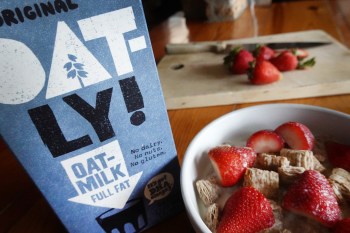Immigrant workers help save Wisconsin dairy farms
Wisconsin is known for its cheese. The cheese-shaped hats that Green Bay Packer fans wear are a quirky reminder of the state’s $50 billion dairy industry. Yet a tough market means that many farmers are having to choose between going out of business or expanding to achieve greater economy of scale.
The Nelson farm is a family operation with 450 cows. Don Nelson has lived in this community his entire life, and raised his children here on the farm. Still working at 85, he told me that at $16 a hundredweight, the price of milk is lower than their costs.
“If we’re losing, and we get a million pounds a month, well, we’re losing about $25,000 a month,” he said.
This kind of price squeeze has helped drop the number of dairy farms in Wisconsin from more than 22,000 in the late 1990s to fewer than 10,000 now. For those that remain, immigrant labor has proven crucial. A 2007 University of Wisconsin study found that 40 percent of the workers on these farms were predominantly Mexican and Central American immigrants. Five of the eight full-timers on the Nelson farm are immigrants.
Some of them get housing, Nels Nelson said. “The ones that get housing, I think, were $11.50 an hour. Some of the ones who don’t get any housing, I think about $13 to $15, somewhere in that range.
For many U.S.-born local residents, these wages, without health insurance and other benefits, aren’t worth the 24/7 schedule involved with milking hundreds of cows. And then there is the risk of injury. Farming is one of the most dangerous occupations in the U.S., with more deaths than in mining or construction.
Near the milking parlor, I met Pablo Hernandez, one of the farm’s Mexican workers, whose head was half covered with white gauze bandages. A cow had pushed him and he’d fallen.
“And I hit my head on one of these water tubes, and a lot of blood came out, a lot, lot of blood,” he said. “Like you had opened one of these water valves.”
Immigrants willing to put in long hours for lower wages than U.S.-born workers have helped many Wisconsin farmers stay afloat. But some farmers are less than scrupulous. Ignacio Garcia earned $10 an hour on a farm with more than 10,000 cows before he says he was fired unjustly, and he turned to a workers’ rights center for help.
“And this person started telling me, look, these are your rights,” he said. “What you did is fine, and your boss was abusing you even if all you were doing was standing up for your rights, but that’s not okay because the law says X, Y, and Z. So I realized that they had broken a bunch of laws.”
Despite such abuses, farmers recognize that immigrant labor is fundamental to their operations. That’s why many farmers and organizations like the Professional Dairy Producers of Wisconsin support comprehensive immigration reform.
There’s a lot happening in the world. Through it all, Marketplace is here for you.
You rely on Marketplace to break down the world’s events and tell you how it affects you in a fact-based, approachable way. We rely on your financial support to keep making that possible.
Your donation today powers the independent journalism that you rely on. For just $5/month, you can help sustain Marketplace so we can keep reporting on the things that matter to you.


















